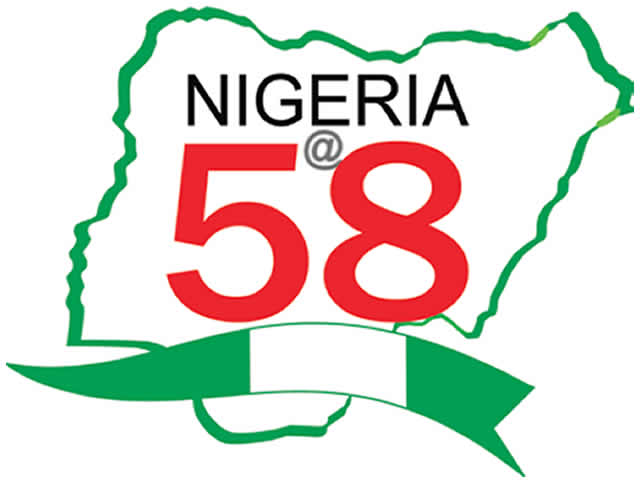On a long road trip on Monday, October 1st, I succumbed to a common temptation that afflicts Nigerians of my generation (fifty somethings and above).I asked my two daughters and their cousins (ages 17 to 28) if they had ever been to an Independence Parade. None did. I asked if they knew what it was. The older two said it was what used to happen on October 1st when school children, soldiers and police played music and marched around. The youngest two had not heard of it. The eldest said it was to celebrate Nigeria’s freedom from colonialism. The second eldest said it was a terrible mistake to let the British go, because things were better under them. I asked her if any bondage was better than freedom. She said all she heard was that every generation since the British left had been worse than the next. I abandoned the discussion and reverted to music. They came back to life.
In 31 years’ time, (that is, in 2050) the oldest of these girls will be 59, and the youngest, 48. They will be adults deeply involved in raising their next generations, earning a living, staying alive and wondering what the next 50 years will mean for their children. They will do this in a nation with a population of 400 million, if they are still living, and living in Nigeria. And if, that is, there is a nation called Nigeria. You can pause here and contemplate if it is all a bit too far away. If you, the reader, are between the ages of 20 and 30, in 2050 you will be between 50 and 60. If you are 40 now, you will be 70, at that age when your life is basically a matter in the hands of younger generations. Indeed, it is very likely that at least 60% of the people reading this material will be alive in 2050. So this is about you.
In 2050, all Nigerians will share their space with another 400 million people. At least 250 million of them will be under 18, which means they will either be entirely dependent on others to produce and feed them, educate and protect them and improve the foundations for their future, or they will live lives on the margins of existence, an existential and permanent threat to all others’ livelihoods and security. An additional 100 million will be dependent on the 50 million productive population to feed, house and care for them, after their lives of toiling for younger generations. 50 to 60 million people will shoulder the responsibility of providing for, and securing the fourth most populous nation on earth under circumstances and foundations that we are laying today.
First, we will have to assume that there will be a nation called Nigeria in 2050.The way we scrutinize and question every element of its nature, structure and operation, it is no longer heresy to suggest that the chances of a single nation, this coat of many colours that fascinates and confounds those who study complex chaos, will remain one single political unit. Nigeria daily bleeds ardent believers in its survival, and now breeds generations who glibly contemplate dismembering it into as many pieces as elites will desire. Worse, the nation lacks a solid layer of champions for addressing its structural and operational limitations, so that it can both survive as one nation, and grow and develop in consonance with its challenges and endowments. Politicians pay lip service to this vital requirement for the nation’s survival, while those who benefit from its weaknesses milk it through poor governance and corruption. If enlightened, organized politics will not address Nigeria’s basic structural limitations, bits and pieces of it will be carved out by endemic violence and strife, until it becomes a mass of humanity drowning in unending conflicts, with much of Africa tied to it.
The best quality of leadership and a strong, growing economy will be required to keep a nation of 400 million with serious ecological problems and huge, growing population, stable and thriving. There will be less land for all purposes, and greater need for a technology-driven economy. Many of the nation’s current security challenges are traceable to poor management of the relationships between ecological and population dynamics. They will get worse, unless sustained political stability, a visionary leadership with bold and imaginative strategies for re-building the Nigerian economy on entirely new ideas and foundations, and an aggressive programme of investments in the nation’s current human capital are guaranteed for the next two decades.
This is where the biggest threat to the nation’s future lies: its unforgivable levels of poverty in the quality of leadership. The nation’s political process is a charade that recycles crushing mediocrity around the elite in a nation bursting with the potential for greatness. Its energy and resources are sapped by pervasive corruption through a state that has become captive of a rapacious leadership, preventing the emergence of an alternative leadership that will break its stranglehold. Poor governance and corruption breed poverty, desperation, collapse of critical institutions of governance and erosion of the legitimacy of the state. Champions of violent change and intolerance will jostle with spreading violent crimes that take increasingly large numbers of citizens hostage, crippling the Nigerian state’s capacity to protect citizens. We do not need foreigners to foretell the possibilities that the Nigerian state will fail, unless a fundamental improvement in its quality of leadership emerges to literary rebuild a nation with untold wealth in human and other resources.
Sadly, there in not much in the political firmament to suggest that the on-going contests for leadership will yield the type of leaders the nation needs to begin the process of preparing for a future that will avoid this nightmare scenario. If President Buhari and his personal coterie of hangers-on return, the nation will spend four years of its next thirty massaging egos, running adrift and blaming it all on a past. If he is replaced by someone from the PDP, the nation will lose four of its next thirty years as new masters embark on vengence, retribution and refined plunder. If the two parties share the spoils, nothing much will happen in terms of governance that addresses security, poverty and gaping holes in the nation’s unity, and faith in its capacity to survive. If President Buhari wins another four-year term, his party will literally evaporate with him when he leaves, because the APC is all about him. Another party may emerge in its place, and another may mutate from the PDP, and the circle will continue.
Nigerians should worry.
Jamila Abubakar wrote this piece from Abuja

 Join Daily Trust WhatsApp Community For Quick Access To News and Happenings Around You.
Join Daily Trust WhatsApp Community For Quick Access To News and Happenings Around You.


